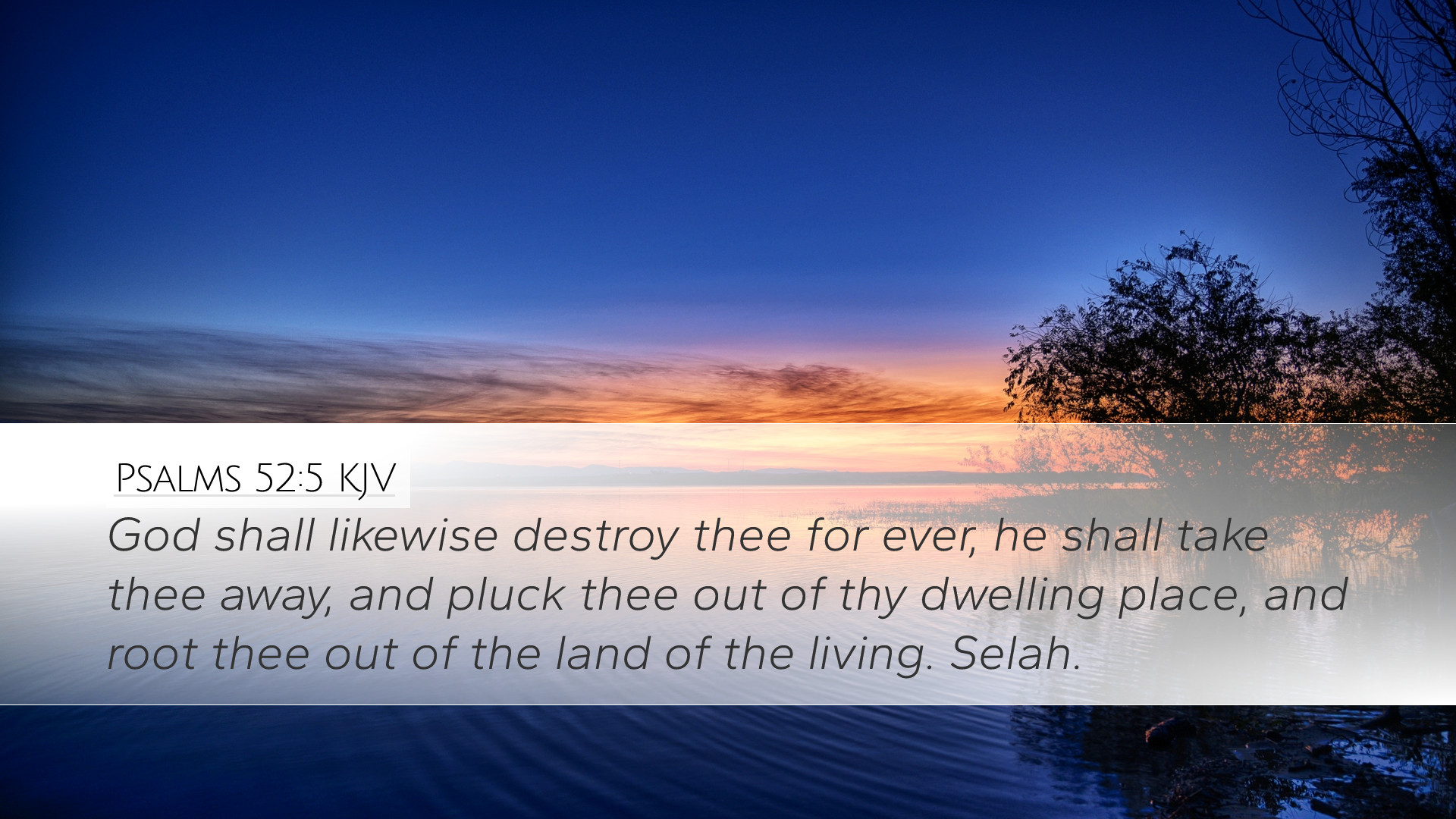Bible Commentary on Psalms 52:5
Verse: Psalms 52:5 - "God shall likewise destroy thee for ever; he shall take thee away, and pluck thee out of thy dwelling place, and root thee out of the land of the living."
Introduction
This verse from Psalms 52 encapsulates profound themes of divine judgment, the fate of the wicked, and the contrast between the righteous and the unrighteous. Through a composite analysis from respected commentaries, we explore the depth and implications of this significant text.
Contextual Analysis
The Psalmist, traditionally attributed to David, is in the midst of a lament against a deceitful and arrogant individual, often interpreted as Doeg the Edomite. Understanding the context of the individual’s actions provides clarity to the grave consequences that the psalmist proclaims.
- Historical Background: The historical setting is crucial, as David wrote this Psalm in direct response to the treachery of Doeg, who informed Saul of David's presence with the priests of Nob, leading to a massacre.
- Thematic Elements: This verse emphasizes divine justice. It reassures believers of God's sovereignty in dealing with evil and the inevitable downfall of those who oppose His people.
Insights from Matthew Henry
Matthew Henry interprets Psalms 52:5 with a strong focus on the fate of the wicked. He remarks on the certainty of God's judgment, where the phrase "destroy thee forever" signifies an eternal consequence for unrepentant sinners. He elaborates on several key points:
- Divine Retribution: Henry stresses that God's justice will ultimately prevail, and those who commit acts of deceit and malice will not escape His scrutiny.
- Removal from Favor: The act of being "plucked out of thy dwelling place" symbolizes the removal of the wicked from God's presence and favor, emphasizing the loss of spiritual and communal stability.
- Warning to the Wicked: This verse serves as a caution, not just for sinners, but a reminder to the righteous to remain vigilant in their walk with God, lest they too fall into the traps of pride and deceit.
Insights from Albert Barnes
Albert Barnes adds to the understanding of this verse by delving into the imagery used by the psalmist. He interprets the "rooting out of the land of the living" as a metaphor for both physical and spiritual death:
- Spiritual Death: Barnes indicates that while the wicked may thrive temporarily, they are ultimately dead in their transgressions and will face spiritual oblivion.
- The Security of the Righteous: By contrast, those who trust in God are assured of their preservation. Barnes highlights that God’s justice serves as a wall of protection around the faithful.
Insights from Adam Clarke
Adam Clarke's commentary focuses on the specific imagery within the text. He notes that the destruction of the wicked is portrayed as a thorough and complete act by God:
- Judgment Unveiled: Clarke reflects on the comprehensive nature of God's judgment, emphasizing that it is not only punitive but also corrective, aimed at addressing the imbalance of moral order in the world.
- The Fate of the Wicked: He suggests that the language used indicates that the left behind by God have not merely perished from this earth, but have also lost their spiritual inheritance.
- Personal Application: Clarke urges readers to reflect on their own lives, asking whether they align more with the sinful and treacherous or with the steadfast and righteous.
Theological Implications
The theological implications of Psalms 52:5 extend beyond immediate retribution. They invite a reflective approach to doctrine and ethics:
- God’s Sovereignty: This verse encapsulates the doctrine of divine sovereignty, highlighting that God retains ultimate control over justice and morality.
- The Nature of Sin: It challenges believers to understand sin's consequences, serving as a stark reminder that unconfessed sin separates one from the fellowship of God.
- Hope for the Righteous: For the believer, the psalm offers hope—not merely for personal salvation but as a collective assurance that righteousness will prevail in the end.
Conclusion
Psalms 52:5 serves a dual purpose: it warns the wicked of their fate while offering comfort and encouragement to the faithful. It highlights God's commitment to justice and reminds believers of their security in God amidst the trials of life.
As pastors, students, theologians, and Bible scholars, understanding this passage deeply enriches our view of God's character and encourages us to uphold righteousness as we navigate a world often swayed by evil.


